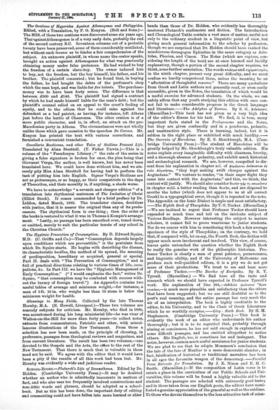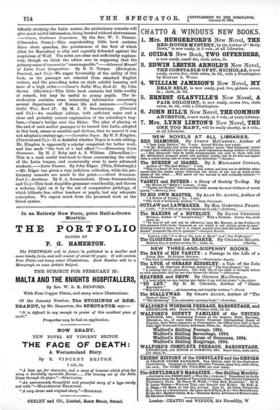SCHOOL-BooKs.—Plutarch's Life of Demosthenes. Edited by Dr. Itolden. (Cambridge University
Press.)—It may be doubted whether at author who is admittedly inaccurate in matters of fact, and who also uses too frequently involved constructions and non-Attic words and phrases, should be adopted as a school- book. But as this has been done, the important duty of editing and commenting could not have fallen into more learned or abler
hands than those of Dr. Holden, who evidently has thoroughly mastered Plutarch's sentiments and diction. The Introduction and Chronological Table contain a vast mass of matter, useful not only to the ordinary student in a linguistic point of view, but giving much general information to the scholar by profession, though we are surprised that Dr. Holden should have ranked the mischievous demagogue Ephialtes in the same category as Aris- tides, Phocion, and Cimon. The Notes (which are copious, con- sidering the length of the text) are at once learned and lucidly explanatory, though a portion of the second chapter requires, we think, some further annotation. The words,raclotaa and axmacyrurabs, in the ninth chapter, present very great difficulty, and we must confess we hardly comprehend them, unless the meaning be an "affectation of thoughtful reserve." There are many quotations from Greek and Latin authors not generally read, or even easily accessible, given in the Notes, the translation of which would be a useful exercise for advanced students. On the whole, we can safely affirm that any youth studying this edition with care can- not fail to make considerable progress in the Greek language and literature.—The Adelphoe of Terence. By S. G. Ashmore. (Macmillan.)—This book has not given us a very high idea of the editor's fitness for his task. We find, it is true, many important facts stated in the Prolegomena and the Notes, but they are given confusedly and in a ponderous, pedantic, and unattractive style. There is learning, indeed, but it is seldom in the right place or exhibited with much lucidity.— The Ourania of Herodotus. By E. S. Shuekburgh, M.A. (Cam- bridge University Press.)—The student of Herodotus will be greatly helped by Mr. Shuckburgh's truly valuable edition. His notes explain every imaginable difficulty with clearness, brevity, and a thorough absence of pedantry, and exhibit much historical and archaeological research. We are, however, compelled to dis- sent from his explanation in chapter xci. of cpepipsvm &Ammer is roils Alrvirras, "they kept making swift charges against the Aeginetans." We venture to render, "in their eager flight they came into contact with the Aeginetans," and this, we think, the context will justify. We should also consider Setvbv yap 1% ElIVICIVTO in chapter xciii. a better reading than dElliY, and are disposed to ascribe the latter (which does not appear to us at all correct Greek) to a typographical error, though it is repeated in the note. The Appendix on the Ionic Dialect is ample and most satisfactory. —The Eighth Book of Thucyclides. By T. G. Tucker. (Macmillan.) —We are inclined to regret that Professor Tucker should have expended so much time and toil on the intricate subject of Various Readings. However interesting the subject to mature scholars, it cannot fail to prove wearisome to junior students. Nor do we concur with him in considering this book a fair average specimen of the style of Thucydides ; on the contrary, we hold that, if compared with, let us say, the Fourth Book, the diction will appear much more incoherent and involved. This view, of course, leaves quite untouched the question whether the Eighth Book be really the genuine work of the philosophic historian. Pro- fessor Tucker is clearly a man of great patience, perseverance, and linguistic ability, and if the University of Melbourne can produce such well-qualified editors, it is a pity we do not get more of their productions. We trust to see and hear more of Professor Tucker.—The Pacchm of Euripides. By R.
Tyrrell. (Macmillan.) We find here all the taste and research which we should have expected in Professor Tyrrell's work. His explanation of line 294,—ixasSmis Acivorov d1-1pas vaxicor,—iv much more plausible and satisfactory than the others that have been suggested; but we are still doubtful as to the poet's real meaning, and the entire passage has very much the air of an interpolation. The book is highly creditable to the editor, to his University, and to the Chair of Greek Literature which he so worthily occupies.—Livy : Sixth Book. By H. M. Stephenson. (Cambridge University Press.) — This book is evidently the work of an editor who understands his author thoroughly ; but it is to be regretted that, probably through aiming at conciseness, he has not said enough in explanation of some difficult passages, and has omitted altogether to notice others. His English, too, is sometimes lax and inelegant. The notes, however, contain much useful assistance for junior students. We are glad to see that he adopts Mommsen'a conclusion that the tale of the fate of Manlius is a mere democratic slander ; in fact, falsification of historical or traditional narrative has been in all ages the favourite weapon of the democracy.—Parallel Verse Extracts for Translation. By .1. E. Nixon and E. H. C. Smith. (Macmillan.)—If the composition of Latin verse is to retain a place in the curriculum of our Public Schools and 17ni• versities, this volume will be found a highly valuable aid to the student. The passages are selected with extremely good taste ; and in those taken from our English poets, the editors have math• fested a genuine appreciation of the graceful as well as the sublime. To those who devote themselves to the less attractive task of scion. tifically studying the Latin metres, the preliminary remarks will give much useful information, being learned without abstruseness. —Cicero, Orationes Ccesariance. By the Rev. W. Y. Fausset. (Clarendon Press.)—This unpretending little book contains three short speeches, the genuineness of the first of which (that for Marcellus) is ably and cogently defended against the scepticism of Wolf. The notes are clear and sufficiently explana- tory, though we think the editor errs in supposing that the primary sense of immanis is "unmanageable."—Advanced Manual of Latin Prose Composition. By B. D. Turner. (Rivington, Percival, and Co.)—We augur favourably of the utility of this book, as the passages are selected from standard English writers, and the preceding notes on style exhibit learning and taste of a high order.—Cmsar's Gallic War, Book II. By John Brown. (Blackie.)—This little book contains but little worthy of remark, but may be useful to young pupils. The in- troduction contains some interesting information concerning several departments of Roman life and manners.—Cesar's Gallic War, Book IV. By M. J. F. Brackenbury. (Percival and Co.)—An excellent edition, with sufficient notes and a clear and probably correct explanation of the schoolboy's bug- bear,—Czesar's bridge over the Rhine. The plan of placing at the end of each author passages to be turned into Latin, adopted in this book, seems so sensible and obvious, that we marvel it was not adopted a century ago.—Cornelius Nepos. By H. N. Kingdon. (Percival and Co.)—It is doubtful whether Nepos is worth editing. Mr. Kingdon is apparently a scholar competent for better work, and has made " the best of a bad affair."—Blententary Latin Grammar. By H. J. Roby and A. S. Wilkins. (Macmillan.)— This is a most useful text-book to those commencing the study of the Latin tongue, and occasionally even to more advanced students.—Latin Unseens. By John Edgar. (Thin, Edinburgh.) —Mr. Edgar has given a very judicious collection, while his pre- liminary remarks are much to the point.—Greek Grammar. Part I.: Accidence. By E. A. Sonnenschein. (Swan Sonnenschein and Co.)—This book simplifies grammar considerably, and throws a welcome light on it by the aid of comparative philology, of which hitherto few, either teachers or pupils, had any adequate conception. We expect much from the promised work on the Greek syntax.



















































 Previous page
Previous page